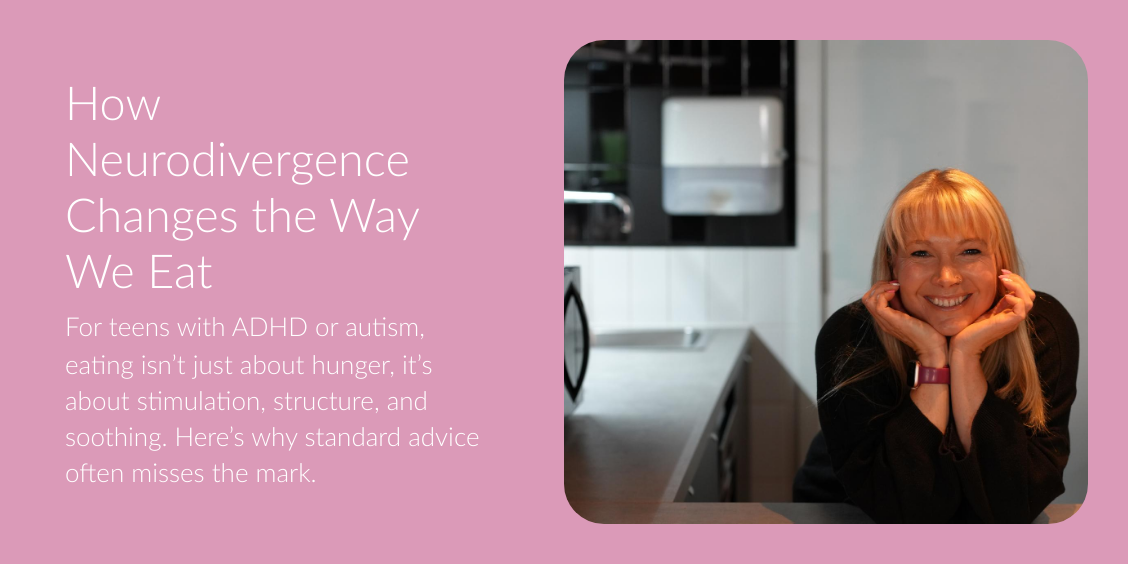Binge Eating Can Start So Much Younger Than We Think
“This is a Guest Blog By Becky Stone, Teen and Adult Eating Disorder Therapist”
When we talk about binge eating, we often picture an adult quietly battling food urges behind closed doors. But what if I told you that I see the very roots of binge eating, the emotional triggers, the body shame, the dopamine-seeking, starting in children as young as Year 8?
And no, this isn’t always about weight. It’s about control. It’s about overwhelm. It’s about growing up in a world that doesn’t always make emotional sense, especially for teenagers.
The Puberty Puzzle: When Bodies Change, So Does Food
Puberty is loud. Not just hormonally, but emotionally, physically, and socially. In Year 8 (around age 12–13), the body goes into overdrive, building bones, producing hormones, and depleting stores of iron, zinc, and magnesium at a rapid pace.
And when those minerals run low? So does mental resilience. Low iron levels can leave teens feeling tired and lethargic. Low zinc can reduce appetite and emotional regulation. This isn’t about diagnosis, I’m not a doctor, but it’s something to be mindful of. When bodies are under stress, minds often follow.
And for many teens, especially those who are neurodivergent, food becomes the one thing they can control.
The Shame of Growing Up (and the Desire to Stay a Kid)
Here’s something I’ve learned in therapy rooms: a lot of young people aren’t rushing to grow up.
➔ They don’t want the curves, the voice drop, the body fat that comes with becoming an adult.
➔ They want to stay small, stay safe.
And food becomes the battleground.
Not eating might feel like a way to pause time. Overeating might feel like a way to numb out. Either way, it’s not about hunger, it’s about coping.
School Stress + Social Media = Shutdown
Teens today are navigating more pressure than ever before:
➔ Academic stress and perfectionism
➔ Social media filters and the “perfect body” myth
➔ Peer comparison
➔ Friendships, fallouts, and trying to “be normal”
For neurodivergent teens, especially those masking ADHD or autism traits, this pressure can be overwhelming. They often hold it together all day and then unravel at home, where food becomes both the reward and the release.
Dopamine from food gives a temporary high, especially sugary, carb-heavy or ultra-processed foods.
It activates the brain’s reward system in the same way as other coping strategies, such as scrolling, gaming, or zoning out.
Binge Eating in Teens Doesn’t Always Look Like You Think
It might look like:
Raiding the fridge after school
Sneaking food into bedrooms
Claiming they’re not hungry, then bingeing later
Grazing constantly, then feeling guilty
Rigid rules during the day, chaos in the evening
And it’s often laced with shame, because deep down, they feel like they’re doing something wrong.
What Can Help
Here’s where parents and carers can make a huge difference:
➔ Keep regular, balanced meals (yes, even for teens who say “I’m not hungry”)
➔ Don’t skip breakfast, it sets up blood sugar for the day
➔ Help teens prep packed lunches together, let them feel some choice and control
➔ Don’t shame food, it’s fuel, comfort, and culture
➔ Talk about body changes before they happen, especially the emotional side
➔ Spot signs of emotional eating and ask gentle questions: “How have things felt this week?” or “Do you notice anything around food when you’re stressed?”
Final Thoughts
Binge eating doesn’t always start with food. It often starts with feelings.
And for many teens, those feelings are complicated, messy, and too big to hold. That’s where support, from parents, schools, and professionals, matters most.
If your child is showing signs of food anxiety, body image distress, or emotional eating, you’re not alone. Support exists. The earlier we help young people rebuild their relationship with food, the easier it becomes for them to grow into adults who don’t have to fight their bodies every day.
Want to know more about teen food anxiety and eating disorders?
Becky works with both teens and adults in recovery from binge eating, restriction, and emotional dysregulation. You can explore her work and find free blogs here: Counsellorwhocares
Counsellorwhocares Email Forms eepurl.com
